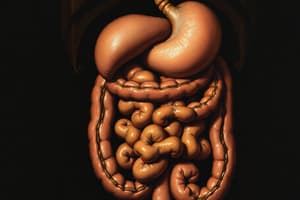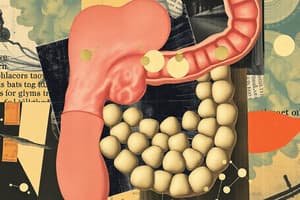Podcast
Questions and Answers
What is the composition of mucus secreted by mucous glands in the GIT?
What is the composition of mucus secreted by mucous glands in the GIT?
- Water, electrolytes, and a mixture of glycoproteins (correct)
- Proteins and lipids
- Hormones and enzymes
- Acids and bases
What are the primary functions of secretory glands in the gastrointestinal tract (GIT)?
What are the primary functions of secretory glands in the gastrointestinal tract (GIT)?
- Secreting digestive enzymes and providing mucous for lubrication and protection (correct)
- Storing excess water and electrolytes
- Producing bile and regulating pH levels
- Absorbing nutrients and eliminating waste
What do serous secretions from the salivary glands contain?
What do serous secretions from the salivary glands contain?
- Mucin
- Ptyalin (alpha amylase) (correct)
- Taste and tactile stimuli
- Large quantities of K+ and HCO3-
What is the function of mucus in the gastrointestinal tract (GIT)?
What is the function of mucus in the gastrointestinal tract (GIT)?
What stimulates salivary secretion in the mouth?
What stimulates salivary secretion in the mouth?
Flashcards are hidden until you start studying
Study Notes
Composition of Mucus
- Mucus secreted by mucous glands in the GIT is composed of water, mucins, electrolytes, and enzymes.
Functions of Secretory Glands
- The primary functions of secretory glands in the GIT are to produce mucus that lubricates, protects, and moistens the mucous membrane.
- Secretory glands also aid in the digestion and absorption of nutrients.
Composition of Salivary Secretions
- Serous secretions from the salivary glands contain enzymes such as amylase and lysozyme.
Function of Mucus
- Mucus in the GIT protects the epithelial lining from mechanical damage, pathogens, and toxins.
- Mucus traps and removes pathogens and foreign particles from the GIT.
Stimulation of Salivary Secretion
- Salivary secretion in the mouth is stimulated by the sight, smell, and taste of food, as well as by chewing and the presence of food in the mouth.
Studying That Suits You
Use AI to generate personalized quizzes and flashcards to suit your learning preferences.




